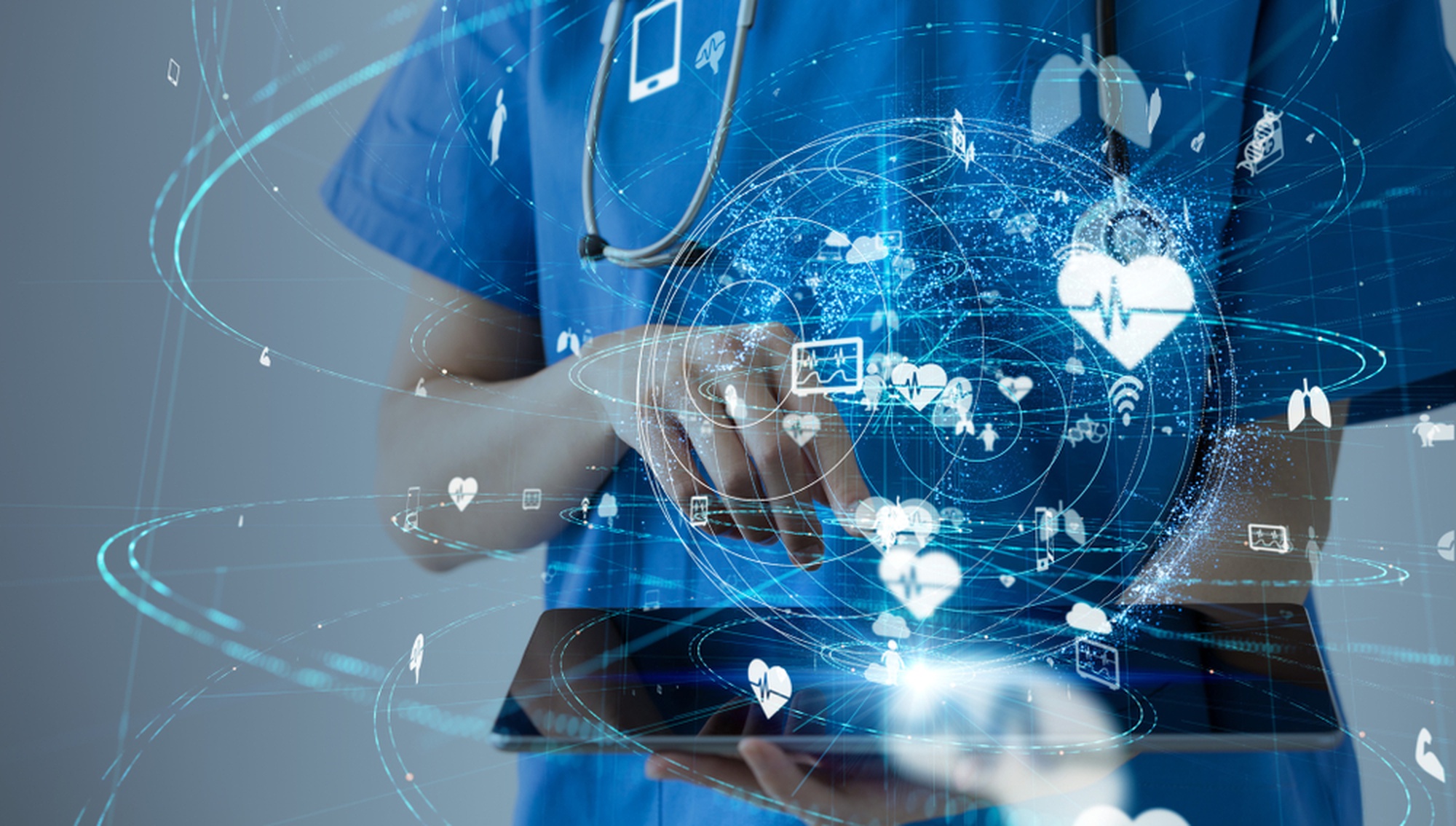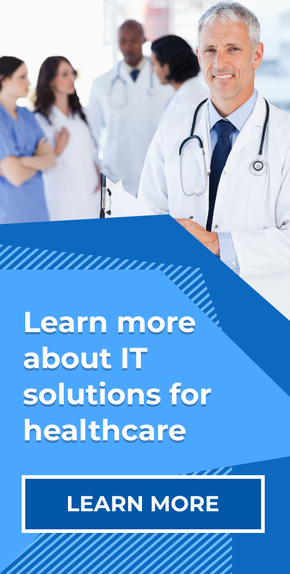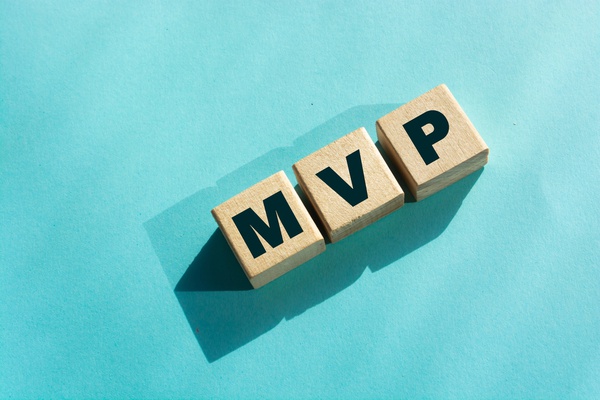The need for a systematic approach to data aggregation and normalization in healthcare is more obvious than ever. Healthcare providers, clinical research, and personal medical devices generate tons of data every second. However, a lot of this information is stored in different hospital management systems that lack interoperability and act like disparate, siloed containers.
In the age of cloud computing and AI, that seems like an oversight, to say the least. With the right applications and resources, any healthcare facility can extract useful insights from medical data. But before analyzing it and drawing conclusions, you'll need to properly aggregate and normalize your input.
Demigos has been developing healthtech solutions long enough to appreciate the value of collecting data, as well as to learn the intricacies of the process. In this article, we’ll explain why it's important to aggregate and normalize data, what solutions exist, and what challenges to expect. The knowledge and ideas we'll share below are grounded in our experience.
Let's start from the top.
The importance of healthcare data normalization and aggregation

A recent report shows that the healthcare analytics market was worth $21.1 billion in 2021 and is expected to reach $75.1 billion by 2026. Experts attribute this exponential growth to government-mandated EHR adoption and an increased focus on population health.
So, if medical data is so abundant, why would you need to aggregate or normalize it? To answer this question, we'll first need some definitions.
What is data aggregation and normalization?
The goal of data aggregation in healthcare is to retrieve relevant data from several sources and compile it into sets for further processing. For instance, you want to improve post-surgery care for patients who received a liver transplant. To do that, you'll need to acquire data from EHR/EMR systems, patient monitors, blood tests, CT or MRI scans, and doctors’ notes.
Even within a single medical organization, data usually exists in a multitude of formats. But what if you use publicly available datasets or exchange information with other facilities? Naturally, there will be differences in terminology, and some data fields may not directly correspond to one another. Healthcare data normalization addresses these issues.
The process of normalization involves organizing data within sets in such a way as to make it ready for analysis. This means removing redundancies and resolving conflicts and then formatting the database according to a certain structure. Oftentimes, there is a need to translate terms or summarize their meaning in order to connect data.
Why does it matter?
So, you've picked your sources based on your objectives, retrieved the data you need, and normalized it. What do you do with those perfectly structured sets of information? You feed them into AI-based software, so algorithms can get to work and start finding patterns and correlations.
For example, in the case of liver transplant patients, the findings may help identify early signs of a deteriorating condition and formulate better care protocols.
Modern AI solutions can work with huge volumes of information at astonishing speeds, but the source data must be of high quality. The larger and richer your datasets, the more meaningful and reliable the insights you can derive from them.
Aggregation and normalization are necessary for achieving interoperability between disparate systems. Taking these steps allows healthcare providers, insurers, and researchers to utilize vastly larger arrays of data. It also ensures that software can digest the data and achieve maximum efficiency when processing it. Fragmented or inconsistent datasets are of little use to machine learning algorithms.
And now, let's look at several use cases of data aggregation in healthcare to get a better understanding of how it works.
How is aggregate data used in healthcare?
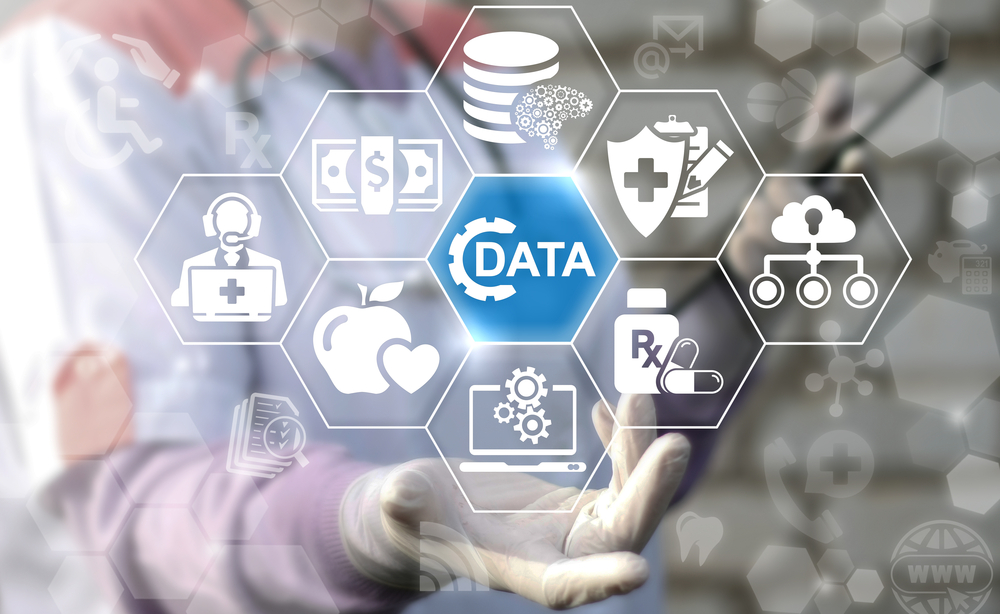
There are numerous applications of data aggregation for healthcare. We have hand-picked those that are most common and most important for healthcare organizations.
Making more accurate predictions
The quality of healthcare data that has been properly aggregated and normalized enables clinicians to accurately diagnose diseases and predict patient outcomes. Such data can be obtained by scanning multiple EHR/EMR systems and comparing patient histories against diagnoses. Add to this the ability of AI-based software to interpret human speech and analyze medical imaging data, and you get a holistic diagnostic/preventative solution.
Improving finance management
Artificial intelligence, machine learning, and predictive analysis can be applied to financial data as well. With the help of these tools, a medical business can get a clearer view of its financial operations, remove inefficiencies, and streamline revenue cycle management.
Creating value and preventing fraud in health insurance
Here's something to ponder: according to various estimates, health insurance fraud costs US taxpayers from $68 to $230 billion every year. Luckily, healthcare data collection and aggregation can effectively reduce the number of fraudulent claims. By exchanging data and applying predictive analysis, insurance companies can detect potential "red flags" and pause payment for such claims.
AI-powered data analysis also aids in shifting the insurance paradigm to a more value-based approach. Insights from aggregate data suggest that covering preventative care and wellness visits is the path to affordable and efficient insurance.
Read also: How to Develop Custom Health Insurance Software
Real-time health monitoring with IoT devices
Algorithms of data normalization in healthcare can be applied to information collected from wearable medical devices. With a well-designed data management system in place, any healthcare facility can offer its patients real-time monitoring of vital signs.
But enough theory. In the next section, you'll find real-world examples of aggregate data in healthcare, with ready solutions by leading vendors.
Data aggregation solutions in healthcare

Medical organizations can choose from various data aggregation solutions on the market. We've selected the list of options below based on their usability and the specific problems they aim to solve.
IBM Watson

The tech giant created an entire platform for advanced data collection and analysis. It's a universal solution for many domains, including healthcare. The tools employ machine learning to tackle various tasks, from speech recognition and NLP (natural language processing) to data discovery. With the help of the platform, healthcare providers can extract meaningful and structured insights from disparate data sources.
IBM Watson joined forces with Pfizer to develop cancer drugs that utilize patients' natural immune responses. By effectively applying aggregation and analytical methods, the two companies made headway in interpreting complex genomic data. The software proved very instrumental in predicting specific types of cancer.
The current offer from IBM Watson includes a variety of Cloud® Paks — proprietary modules that can be used for specific purposes. You'll need to carefully select the modules with the help of a consultant to form a package for your needs.
Hitachi Vantara
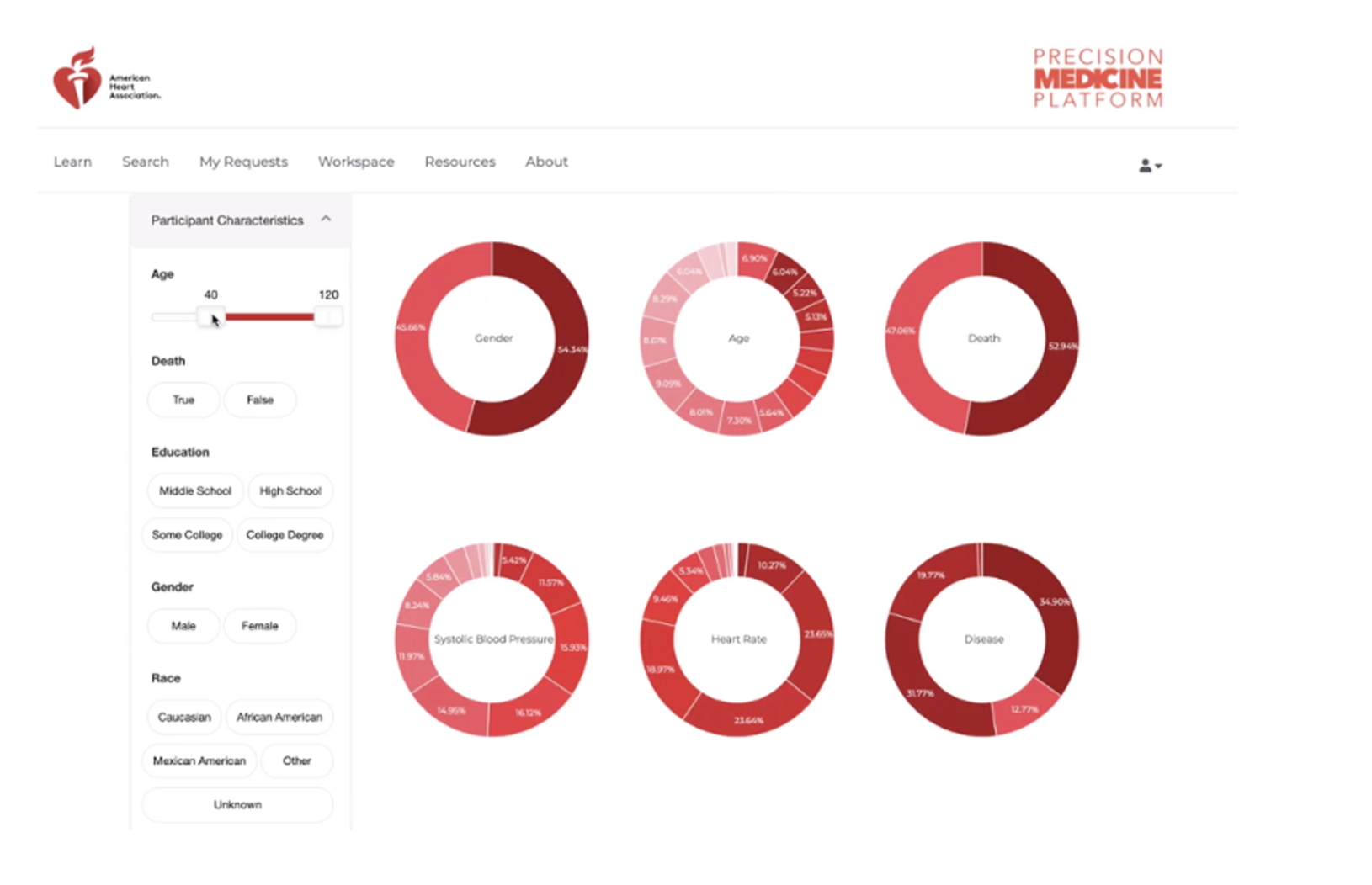
The American Heart Association (AHA) has recently updated its Precision Medicine Platform in partnership with Hitachi. Originally developed for cardiology research, the platform now allows clinicians and researchers to access and analyze data aggregated from hundreds of medical facilities.
The solution contains all the necessary tools for data search and analysis, as well as for sharing the findings. Everything takes place in the cloud, and all transactions are secured in accordance with the standards of Hitachi and Amazon Web Services.
The updated platform once again proves the importance of data aggregation in healthcare. It removes bottlenecks, facilitates collaboration, and lets healthcare professionals focus on data-driven research. The Precision Medicine Platform is extremely advanced and functional and can be highly recommended if your primary area of interest is heart disease.
NextGen® Connected Health Solutions

California-based NextGen offers a wide variety of solutions for enterprise and smaller-sized healthcare providers. Its Connected Health software utilizes AI technology, data aggregation, and normalization methods to deliver the following set of features:
-
Secure exchange of health information between disparate systems for patients
-
Support for data-driven clinical decisions
-
Effective care management for positive patient outcomes
-
Production of clinical quality reports
-
Patient engagement
-
Integration with the current EHR or use of NextGen® Enterprise applications
A feature-rich and multifaceted tool, Nextgen's Connected Health suite consists of multiple modules that cater to typical needs.
But if your needs are unique or you cannot find a ready-made solution with the necessary functionality, it’s better to opt for custom development. A custom software product can be built with the specifics of your business in mind and later fine-tuned to reflect changes in your objectives.
Now that we've looked at a few available solutions for data aggregation for healthcare, let's quickly sum up the benefits they can provide.
Benefits of data aggregation in healthcare

The health industry can win in so many ways from adopting data aggregation and normalization. Generally, the benefits stem from the ability to analyze data at scale while combining previously unconnected sources. Here are the most valuable advantages:
-
Increased value of care and resource optimization. Data analysis can help reduce costs for the facility and provide a more comprehensive service to patients. Looking at data combined from different sources, providers can achieve a more holistic view of the patient's health and optimize resources to avoid unnecessary expenses.
-
Better patient outcomes. Thanks to patient data normalization, doctors can make better clinical decisions, more specific predictions, and devise more effective treatment plans.
-
A major boost for clinical research. Sharing research data is much easier when the data has gone through standardization procedures. In addition, cloud-based AI systems can dramatically reduce the time needed for analysis with properly structured datasets.
-
New medical products. With quicker and more reliable testing based on more refined data, companies can develop new wearable devices and pharmaceutical products in less time. Similarly, healthcare providers and insurers can join efforts in devising new plans and packages.
Read also: Pharmaceutical Software Development Guide
Of course, the process of adoption won't be completely painless. The next section will provide more details.
Healthcare data aggregation and normalization challenges

Dealing with the issues listed below can be very unpleasant, so try to nip them in the bud at the earliest stages of software development.
Security concerns
Electronic health records and patient-generated data contain PHI (protected health information). In the US, the use and exchange of such information are governed by the provisions of HIPAA — the Health Insurance Portability and Accountability Act. This imposes strict security limitations on data aggregation software in healthcare. Sensitive data can't be lost, altered, or disclosed in the process of collection and normalization.
Interoperability issues
Clinical data collection and aggregation would be easy and normalization almost unnecessary in a utopian world of across-the-board interoperability. Unfortunately, many systems used by today's medical facilities were created long before the introduction of data exchange standards. This fact greatly impedes the adoption of AI-based software solutions, which need structured data to operate.
Lack of skilled professionals to oversee transition
Organizing data in a healthcare database can't be done by IT pros alone. It requires experienced medical staff to provide their input and set goals for analysis. Hospitals can't always spare the resources needed to complete the transition. On top of that, the in-house IT team may lack the required qualifications and background in data science and AI.
Generic analytics software: not always a perfect fit
The current selection of data aggregation solutions and platforms is quite large. However, the vendors' generic offers may not always meet the business needs of your organization. You may be overpaying for redundant features while not getting the exact tools you need. This is a strong argument in favor of opting for a custom data aggregation solution.
Overall, most of the issues described in this section can be overcome. Accepting help from a reputable software partner, from simple consulting to actually developing custom software, is one of the options to consider. For one thing, it can save you the hassle of ensuring the software is HIPAA compliant. Also, a company that has previous experience with similar healthtech projects will be familiar with data mining techniques.
Aggregate and normalize with a trusted partner
The issue of data aggregation and normalization in healthcare is as topical as it gets. Industry players, however large or small, can benefit from tapping into the field of AI-based data analytics. Besides numerous advantages for individual businesses, an intensive exchange of medical data can yield dramatic results for the future of healthcare worldwide.
Read also: Data Analytics in Claims Management
Our team at Demigos is ready to invest our time and knowledge into your medical business. We'll help your organization achieve better efficiency and reach new heights in the quality of medical services. With our strong background in healthtech software solutions and agetech in particular, we can tackle projects of any scale.
Get in touch with us, and let's make data work for you.

